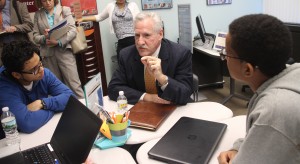Commissioner visits with Latino students on NECC campus
Eagle Tribune, 2-4-16, P. 1
BY ZOE MATHEWS
zmathews@eagletribune.com
LAWRENCE — Carlos Santiago, the first Latino to be named Massachusetts Commissioner of Higher Education, Wednesday visited the Lawrence campus of Northern Essex Community College, where about 60 percent of the students are Latino.
“Massachusetts doesn’t rank as well as it can in supporting its students … especially its first-generation students,” he said. “That gatekeeper mentality of sink or swim was fine years ago, but we can’t afford anyone falling through the cracks in today’s economy.”
Santiago met with students in the Student Success Center (SSC), which opened in the 2011 with money from a Title V grant, and now serves about 600 students. The grants provide money to Hispanicserving institutions so they can maintain and expand educational opportunities. Each student he spoke to at the SCC is a first-generation college student with Latino roots.

State Commissioner of Higher Education Carlos Santiago, center, speaks with NECC biology student Nathanael Sencion, left, and engineering student Maireny Rodriguez-Aquino, right.
Gisela Nash, director of the Student Success programs, said students who utilize the center show an 11.3 percent higher course completion rate and a 19 percent higher retention rate when compared with Latinos not using SSC services.
Santiago talked to students about some of the challenges they face — from access to English as a second language courses to the cost of books. He asked the students what resources they wish they had as incoming freshmen.
“There wasn’t a lot of information about summer classes or transfer credits,” said Carla Gonzalez, a business transfer student.
Maireny Rodriguez-Aquino, an engineering science student, agreed.
“People say community college takes two years, but something always comes up,” he said, “and we end up staying for longer.”
Santiago asked what else could be done to make sure students graduate on track, and the students said just having the SSC was a big help in keeping them motivated. Santiago talked about his efforts to make credits transfer to any public higher education institution in the state, and creating a path to a four year degree.
“Our work to create a unified system of transfer, though perhaps not characterized as glamorous, translates into direct timeand- money savings for these students,” Santiago said.
Noemi Custodia-Lora, Executive Director of the Lawrence Campus and Community Relations, talked about the school’s efforts to engage the community.
“We know that there are people here who graduated from other countries,” she said, “but that might not be able to transfer their qualifications when they move to Lawrence.”
NECC is also building relationships with colleges in the Dominican Republic as part of an effort to help residents pursue higher education. Mayor Daniel Rivera recently returned from a trip to the Dominican Republic where a formal agreement was signed between NECC and the Instituto Tecnico Superior Comunitario, the Dominican Republic’s first public two-year college which opened in January 2013. Glenn said partnerships with schools in Central America help students transfer credits easily.
Santiago came to Massachusetts as the Senior Deputy Commissioner for Academic Affairs in 2013, from Milwaukee, where he was Chancellor of the University of Wisconsin. He has over 30 years experience in public higher education.







